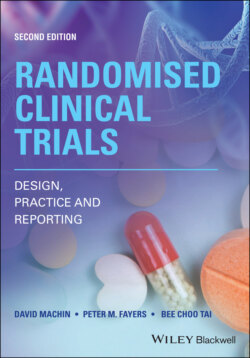Читать книгу Randomised Clinical Trials - David Machin - Страница 41
1.9 Regulatory requirements
ОглавлениеIn addition to the more overtly scientific parts of the clinical trials process on which to focus, there are many regulatory requirements which national and international law obliges a trial team to adhere to. For example, the regulations insist that informed consent is obtained from patients entering trials and on the preservation of personal data confidentiality. These regulations are generally referred to as requirements for Good Clinical Practice (GCP) as is described in ICH E6 (R2) (2016). We will refer to specific aspects of GCP as they arise in the text, but readers are cautioned that the specifics are continually being updated. Principles to guide statisticians working on clinical trials have been laid down by ICH E9 (R1) (2018).
If the trial is seeking regulatory approval of (say) a new drug, then all the associated requirements for approval should be reviewed by the trial team before, during and after the trial protocol is being developed to ensure that all aspects are covered so as to avoid the rejection of the application on what might be a technical detail. For example, there may be a regulatory requirement for some additional animal studies to be conducted before approval can be granted. These requirements are summarised in documents such as those provided by the European Medicines Agency (EMEA) and the US Food and Drug Administration (FDA).
In some circumstances, it is a requirement for regulatory approval that a confirmatory trial is conducted. Such a trial is essentially a repeat of an initial one, perhaps in a different or wider patient group or with a wider group of clinical teams involved, but it must follow the essential features of the predecessor design. Clearly, these details should be cross‐checked with the relevant authorities before the protocol is finalised and patients are recruited.
